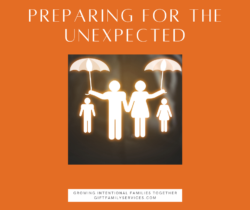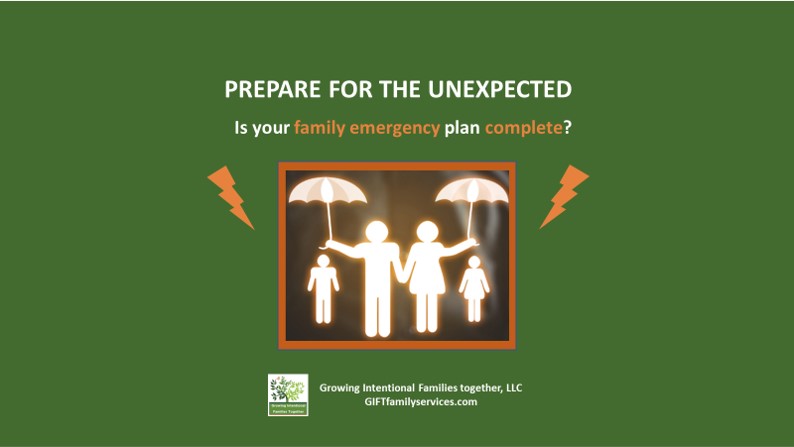 If you are an adopted parent, you have probably experienced many encounters with the unexpected. For most of us, the first “surprise” was infertility. We expected we would become pregnant fairly easily. But that is not what happened. Instead, our children joined our families via adoption. We attune to and love the children whom we adopted and value the unique notes that they infuse into our family symphony. When families are composed of so many different elements, the unexpected becomes the norm. We need to become pros at handling and preparing for the unexpected. Curveballs arrive from many sources.
If you are an adopted parent, you have probably experienced many encounters with the unexpected. For most of us, the first “surprise” was infertility. We expected we would become pregnant fairly easily. But that is not what happened. Instead, our children joined our families via adoption. We attune to and love the children whom we adopted and value the unique notes that they infuse into our family symphony. When families are composed of so many different elements, the unexpected becomes the norm. We need to become pros at handling and preparing for the unexpected. Curveballs arrive from many sources.
Sometimes the surprises unfold through our child’s unique interests and talents. A family who can’t carry a tune in a bucket finds delight in the talent of their musically gifted child. An athletic clan is stunned by the artistry of their child who builds with Lego, wood, or recycled materials skillfully and effortlessly.
Surprises are not always pleasant. Sometimes unexpected factors are more challenging, like a child’s medical issues that were unforeseen because of incomplete medical histories.
When the unexpected is challenging
Sometimes it is the world that delivers the unexpected, e.g., the pandemic which we are all currently facing. Sometimes it is Mother Nature who drops a fair share of the unexpected on our doorstep in the form of floods, hurricanes, fires, and tornados. As Intentional Parents, it is imperative that we plan ahead to predetermine our responses. Create a well-stocked Adoption Attuned emergency preparedness kit. This means that it will include some atypical elements which I will list further in the blog post.
Being proactive telegraphs to our children a message of preparation. It makes visible and exemplifies our ability to meet any unexpected challenges. This reassures our children and helps reduce their anxiety and concerns. An additional bonus is that we will be better prepared to meet whatever comes our way. We will avoid the chaos that occurs when danger is predicted and everyone rushes to make last-minute preparations. . Instead, we can spend time reassuring our kids that we have done our best to prepare the family to face and survive an impending danger.
Because our children joined our families through adoption, they’ve already experienced the loss of one family. It is understandable that they will be especially concerned about the safety and permanence of their adopted family. Family fracture is absolutely something that they do not want to experience again. This danger feels quite real to them. Completing observable preparations offer our children tangible and visible evidence that we have things in hand.
Covid-19 currently dominates the headlines. Reports of folks dying occur daily and they are no longer concentrated in the elderly, now folks of every age are endangered and dying. And it is not just the vulnerable and ailing. This means it is important that we commit to ensuring that we have prepared properly for the possibility that a disaster might strike us down. It could be a health crisis, a car accident, or a weather event that might turn our lives upside down. A dire event could come out of the blue and cause a permanent disability or even death. Our home could be destroyed in a natural disaster.
We want to be sure that we have prepared for this. Make sure we have current wills, Advanced Directives, and guardianship plans on file. Guarantee that the people you have named for this role agree to take on this immense responsibility. Do not assume that they would be willing to take on this responsibility. Be certain that they are educated on Adoption Complexity, Adoption Trauma, and understand what it would mean to parent with an Adoption Attunement approach.
Creating an emergency preparedness plan
Be sure to write down your Emergency Preparedness Plan. Keep it with your wills. Clearly label it with the names of the people you have designated to care for your children. Inform the guardians where they will be able to find it if disaster should befall your family. Some of the things Emergency Preparedness Plan should include:
- The children’s doctors and any medication they are taking
- A summary of what types of responses, discipline, and activities work for your child
- A copy of the IEP or other education plan
- One name of a supportive educator in your child’s life
- Notes about parenting techniques you do or do not want to have applied to parenting your child
- A list of all of the important people in your child’s life and their current contact information
- A list of adoption supports that you have used, including the name(s) of therapists, coaches, and/or support group
A list of current therapists, coaches, or other mentors who work with your child now or in the past. - A list of the skills and approaches you would want the caregivers to look for in an adoption-competent professional (refer to Adoption Attunement Quotient for help)
- A list of websites you have found helpful in understanding your child or any diagnoses or special characteristics your child has.
- An explanation of the parameters and responsibilities of your Open Adoption agreement if you have one. Contact information.
- Any additional resources
The benefit of talking things through
How might your family benefit from talking about disaster preparedness? In my own family, my grandson has known since he was four who would care for him if anything ever happened to his mom and dad. Because he’d known several people who had unexpectedly died, we felt it was important to talk about this. He could recite the succession of caregivers. Periodically he would confirm with me the names of who would care for him. Clearly, it provided him with a degree of comfort.
Like my grandson, all kids live in the world. They hear about tragedies happening like car accidents, house fires, hurricanes, etc. Bringing the topic into the open creates the opportunity to reassure them. Letting them know that you’ve planned ahead will increase their sense of safety. This is especially important to adopted children because they have already experienced significant losses in their lives.
Plan for the unexpected. An Emergency Plan is something that you hope you never need to use. You don’t want to discover in the face of disaster or tragedy for which you need a guardian or an Emergency Plan and do not have one.
__________________________
- Call us at 1-800-653-9445
- Listen to our podcasts: Adoption Matters: Real People. Real Life. Real Talk and Essentials of Adoption Attuned Parenting
- Watch our YouTube channel
- Read Books written by our coaches
- Click to learn more about Adoption Attuned Certified coaching!



